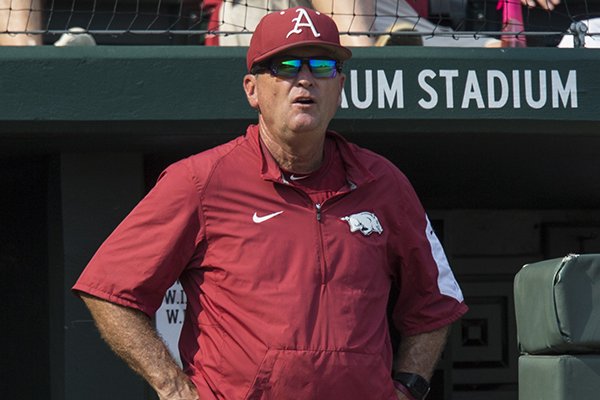LITTLE ROCK — Two Baum Stadium victories away from a trip to the College World Series, Arkansas has already met the preseason expectations of most reasonable Razorback fans.
But, understandably, many have taken stock of Arkansas’ situation and reset the bar.
For any team in the SEC West, being the No. 5 seed in the country, co-champion of the division and recording a 3-0 record in a regional should add up to a pretty nifty season. But, considering that Arkansas is 3-1 against a South Carolina that is the foe this weekend and that the Razorbacks have been almost unbeatable at home, many fans won’t be satisfied with anything less than their team winning its way to Omaha.
On this moving scale, the question is what criteria will be used to judge whether the season is successful. Options include:
—Win the CWS.
—Get to the championship game in Omaha.
—Be one of eight to win a Super Regional.
Also in play, is the thinking reshaped if the Gamecocks win the third game because of something as quirky as a fluke hit or a developing blister on the throwing hand of the Razorbacks’ starting pitcher?
To a neutral observer, the season is already a success and the Razorbacks’ No. 5 seed is underappreciated.
For an accurate handle on Arkansas’ seed, view the 64-team baseball bracket the same way as the NCAA basketball bracket. In other words, imagine four No. 1 seeds in 16-team brackets. In that vein, picture the Razorbacks as the top No. 2 seed and remember that almost every March some media members grouse publicly about why the most highly ranked No. 2 seed was not a No. 1. This year, the argument was No. 2 North Carolina vs. Xavier, the fourth No. 1.
For Arkansas, the target would have been No. 4 Ole Miss, which won a series from the Razorbacks in March and shared the West title, but did not get out of the Oxford Regional.
Meanwhile, cherry picking results from the 16 double-elimination regionals provide mixed signals about such things as home field advantage in college baseball and strength of conference.
Before delving deeper, know that making projections about the super regionals based on last week’s outcomes are meaningless. Preparing to meet the Razorbacks for the fifth time this year, South Carolina coach Mark Kingston summed up the situation with an accurate cliché: “Whoever makes the most pitches, gets the most big hits and plays the best defense, that’s who will win.”
Precisely half of the 16 teams seeded first in the regionals advanced, meaning the home teams were 8-8.
Arkansas is 32-3 in Fayetteville and Ole Miss had a similar record at home so, if the home field is a measurable advantage, how come the Razorbacks are still playing and the Rebels couldn’t find a way to beat Tennessee Tech in either end of a doubleheader?
In the first game, the Golden Eagles led 10-0 after six innings and won behind a pitcher who threw seven scoreless innings in his first start of the year. In the second game, Ole Miss led 2-0 in the sixth, but lost 3-2 when a reliever with a 6.30 ERA pitched three scoreless innings.
Go figure.
The super regional is a first for Tennessee Tech. Same with Stetson, Washington, Minnesota and Duke. It is the darned Blue Devils who watered down a disparaging take on the ACC.
From 1999, when the tournament was expanded to 64 teams, through last year, the ACC placed 124 teams in the tournament and Virginia in 2015 was the league’s only CWS champion. Miami won titles in 1999 and 2001, but that was before the Hurricanes joined the ACC.
Overrated comes to mind and, until Duke maneuvered through the loser’s bracket to win at Georgia, Coastal Division winner North Carolina was the only survivor among the ACC’s six teams.
Playing at home, Clemson, the Atlantic Division winner at 22-8, lost twice to SEC East fourth-place finisher Vanderbilt, including 19-6 in the regional final when the Commodores hit nine home runs.
From 1999-2017, the SEC provided 147 of the 1,216 tournament participants and won the CWS six times while the Pac-12 won four championships with 88 teams.
This year, the SEC tied its own record with 10 teams and the league is guaranteed three spots in Omaha because six are still playing, all against other SEC teams. In addition to the matchup in Fayetteville, Auburn is at Florida and Mississippi State is at Vanderbilt.
Four of the top eight seeds were eliminated in the regional, more than double the norm for the past 19 years. Five of the top eight seeds reached Omaha last year vs. the average of 4.5 from 1999-2017.

